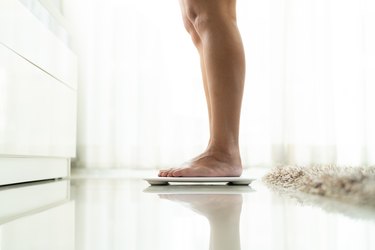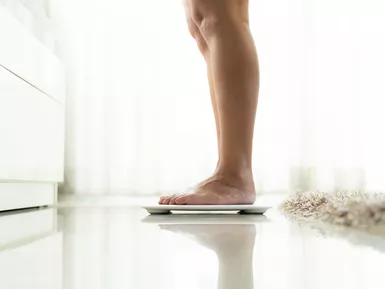
Weigh yourself first thing in the morning every time for the best picture of your progress.
Image Credit: Ponchai Soda / EyeEm/EyeEm/GettyImages
Regularly stepping on the scale can help you keep tabs on your weight-loss progress. But you’ll get the most useful information when you weigh in at the right time.
“Hopping on the scale at regular intervals helps you be more accountable to yourself about your weight,” explains Lisa R. Young, PhD, RD, adjunct professor of nutrition at New York University and author of Finally Full, Finally Slim.
Video of the Day
While there’s no one-size-fits-all answer for what that might look like, experts do agree on a few key factors for successful weight tracking. Here’s how to determine the best time to weigh yourself, how often you should do it and what to do if stepping on the scale seems to be causing more harm than good.
The Best Time to Weigh Yourself
While you can get a ballpark estimate of your weight at any time of the day (or night), you’ll get the most accurate results by stepping on the scale first thing in the morning, according to the Cleveland Clinic. (That’s after you’ve emptied your bladder, but before you’ve taken a bite of breakfast or sip of coffee.) Wait until later in the day, and food and liquids sitting in your digestive tract can change your results.
Try to use the scale on the same day each week, too. Findings published in the February 2014 issue of Obesity Facts show that our weight tends to increase over the weekends, when we’re more likely to treat ourselves. Weigh yourself on Sunday morning after Saturday night’s rich restaurant dinner, and the number might read a little higher than normal for you.
We Recommend
For that very reason, Young likes to make Tuesday the standard weigh-in day. “Monday is too close to the weekend. Tuesday gives you most of the week to improve your habits for the week,” she says.
If weighing in at another time or day works better for you, that’s OK too. Just be consistent. “Aim for the same day each week, at the same time,” says Seattle-based nutrition expert Liz Wyosnick, RD.
How Often to Weigh Yourself
Research suggests that daily weigh-ins may be the most effective for weight loss. In an October 2019 study in the Journal of Behavioral Medicine, adults who weighed themselves six or seven times a week lost around 1.7 percent of their body weight within a year. Those who checked in with the scale just once a week didn’t lose anything.
Advertisement
Not all experts agree that weighing daily is best, though. Stepping on the scale every day might cause a person to focus more on achieving a certain number than developing healthy eating and exercise habits that can support long-term success.
“I advise people to weigh themselves no more and no less than one time per week,” Wyosnick says. “Safe and sustainable weight loss is not found within minor fluctuations of body weight from one day to the next. It is better to assess progress over a longer time allotted for practice and adoption of your new habits.”
Young, too, recommends stepping on the scale just once or twice a week. “We have daily fluctuations, and for some people, daily weighing can lead to obsessing about weight, which you don’t want,” she says.
6 More Tips for Weighing Yourself
Looking for more advice on how to make the most of your weigh-ins? Keep these tips in mind.
1. Wear the Same Thing Every Time
Stepping on the scale naked will give you the most accurate reading. But if you’d rather weigh yourself with clothes on, that’s fine too. Just aim to wear the same type of outfit each time and avoid anything too bulky or heavy, like a jacket or shoes.
“Wearing a T-shirt and underwear is good,” Young says.
Prefer to hop on the scale after exercising? That works, but remember to take off your sneakers first.
2. Use a Digital Scale
They’ll give you a more precise reading compared to old-fashioned spring-loaded scales, according to the Centers for Disease Control and Prevention (CDC).
Advertisement
Make sure to place the scale on firm, even flooring like wood or tile instead of a softer surface like carpet.
Related Reading
3. Track Your Progress
Taking note of your number each week can help you spot general trends, even if there’s an instance where you don’t lose as much as you were expecting.
Research in the March 2021 issue of Obesity suggests that logging your weight in a digital app is tied to the greatest weight-loss success. (And there are plenty of great options to choose from.) But if you’d rather go low-tech, a notebook and pen get the job done too.
4. Don’t Panic Over Some Weight Gain
One higher-than-expected reading doesn’t mean you’re a failure. In fact, the average adult’s weight can fluctuate by as much as 4 pounds over the course of just a few days, according to a July 2017 study in Physiological Reports.
Blips on the weight radar can happen due to hormonal fluctuations, sodium consumption and even whether you’ve had a bowel movement recently, Wyosnick says.
“Stay consistent with your weight-loss practices, and only once your weight has not budged for six to eight weeks, then consider a different approach,” she says.
Related Reading
8 Times It’s Completely Normal to Gain a Little Weight (So Don’t Stress)
5. Find Other Measures of Success Too
Weight-loss progress comes from regularly engaging in healthy behaviors. So instead of just paying attention to what the scale says, keep track of the good-for-you habits that are driving your success too.
“Nobody lost weight just by weighing themselves,” says Wyosnick. “So rather, many times I have people track their physical activity minutes, water intake or consumption of non-starchy vegetables. These parameters are much more in your control, and with time, will lead to the desired outcome.”
6. Stop if Weighing Triggers Negative Feelings
Consider giving the scale a break if weighing leaves you feeling lousy or triggers unhealthy eating or exercise behaviors, Young says. You should also avoid weighing yourself if you have a history of an eating disorder, recommends the Cleveland Clinic.
Instead of using pounds to guide your progress, focus on Wyosnick’s success metrics that are within your control, or pay attention to how your clothes are fitting. “It’s important to realize that the scale is simply a guide,” Young says.
Related Reading
6 Ways to Tell if You’re Losing Weight Without Hopping on a Scale



